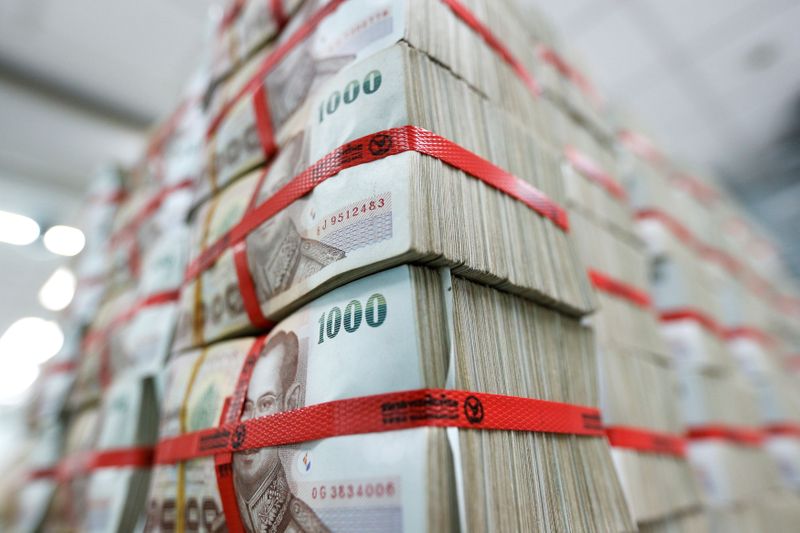(Reuters) – Bearish bets on Thailand’s baht hit a more than six-month low, while investors turned bullish on some emerging Asian currencies after months, a Reuters poll showed on Thursday, as worries around COVID-19 ease and vaccinations pick up pace.
Countries, including Malaysia, Indonesia, and Thailand, have seen a drop in infections, enabling them to relax restrictions, while Singapore last month became the world’s most vaccinated country after it fully inoculated 80% of its population.
The U.S. Federal Reserve holding off on earlier-than-expected tapering of its massive asset purchases kept the dollar in check and further supported sentiment towards emerging currencies.
Investors placed long bets on the Chinese yuan for the first time since mid-July, and cut short bets on South Korea’s won, Malaysia’s ringgit and the Philippine peso, according to the poll of 11 respondents.
They also turned bullish on Singapore’s dollar and Indonesia’s rupiah for the first time since mid-June.
Short positions on the baht unwounded to their lowest since Feb. 25 as the tourism-reliant economy relaxed COVID-19 curbs, prompting its leading joint-business group to raise its 2021 economic forecast.
Market view of the region’s worst performing currency this year was also buttressed after Prime Minister Prayuth Chan-ocha survived a no confidence vote in parliament last week.
The baht is not out of woods yet, however, analysts at DBS Bank said while highlighting Thailand’s flip to a current account deficit since last year and potential policy normalisation from the Fed.
“Thailand’s need for external financing is coming at a potentially challenging period. The Thai baht is therefore vulnerable to any surprise in the Fed’s hawkish tilt,” they said.
The baht was seen weakening to 35-36 against the greenback by the first quarter of 2022. The currency traded at around 32.70 against the dollar on Thursday.
Long bets on India’s rupee rose to their highest in more than six months, as investors were convinced that a sustained economic recovery was underway despite warnings of a possible third wave of COVID-19 infections.
“Policy makers are likely to remain wary about potential increases in infections and their impact on economic activity,” Standard Chartered Global Research said in a note this week.
“However, given the recent increase in vaccinations and the reduced sensitivity of economic activity to COVID-19 infections, the impact of any future rise in infections is unlikely to derail the recovery process.”
The Reuters survey is focused on what analysts believe are the current market positions in nine Asian emerging market currencies: the Chinese yuan, South Korean won, Singapore dollar, Indonesian rupiah, Taiwan dollar, Indian rupee, Philippine peso, Malaysian ringgit and the Thai baht.
The poll uses estimates of net long or short positions on a scale of minus 3 to plus 3.
A score of plus 3 indicates the market is significantly long U.S. dollars. The figures included positions held through non-deliverable forwards (NDFs).
The survey findings ASIAPOSN are provided below (positions in U.S. dollar versus each currency):
DATE USD/CNY USD/KRW USD/SGD USD/IDR USD/TWD USD/INR USD/MYR USD/PHP USD/THB
09/09 -0.09 0.33 -0.36 -0.44 -0.69 -0.88 0.23 0.40 0.12
26/08 0.425 0.868 0.474 0.18 0.326 -0.08 1.1922 0.779 1.351
12/08 0.32 0.69 0.77 0.2 -0.09 0.37 1.39 1.17 1.75
29/07 0.27 0.78 0.71 0.27 0.36 0.29 1.4 1.21 1.49
15/07 -0.15 0.27 0.53 0.23 0.13 0.68 1.06 1.06 1.56
01/07 -0.29 -0.29 0.02 0.36 -0.19 0.5 0.49 -0.04 0.85
17/06 -0.63 -0.36 -0.49 -0.5 -0.58 -0.21 -0.05 -0.31 0.2
03/06 -1.34 -0.51 -0.55 -0.4 -0.44 -0.71 0.32 -0.66 0.37
20/05 -0.33 0.43 0.37 -0.06 0.33 -0.03 0.26 -0.22 0.81
06/05 -0.52 -0.39 -0.58 0.31 -0.59 0.86 -0.04 -0.35 0.5
(Reporting by Shashwat Awasthi; editing by Uttaresh.V)






















